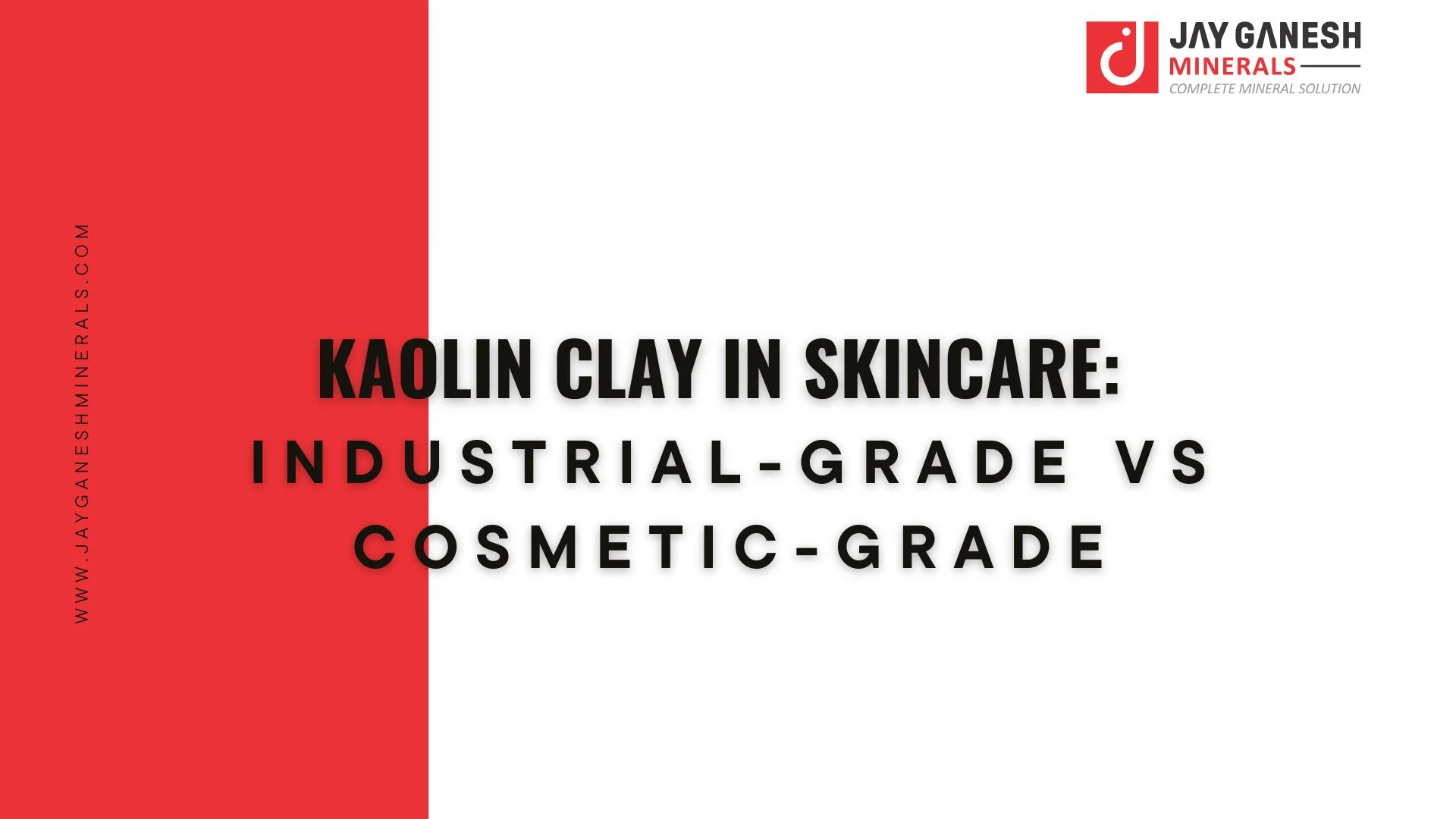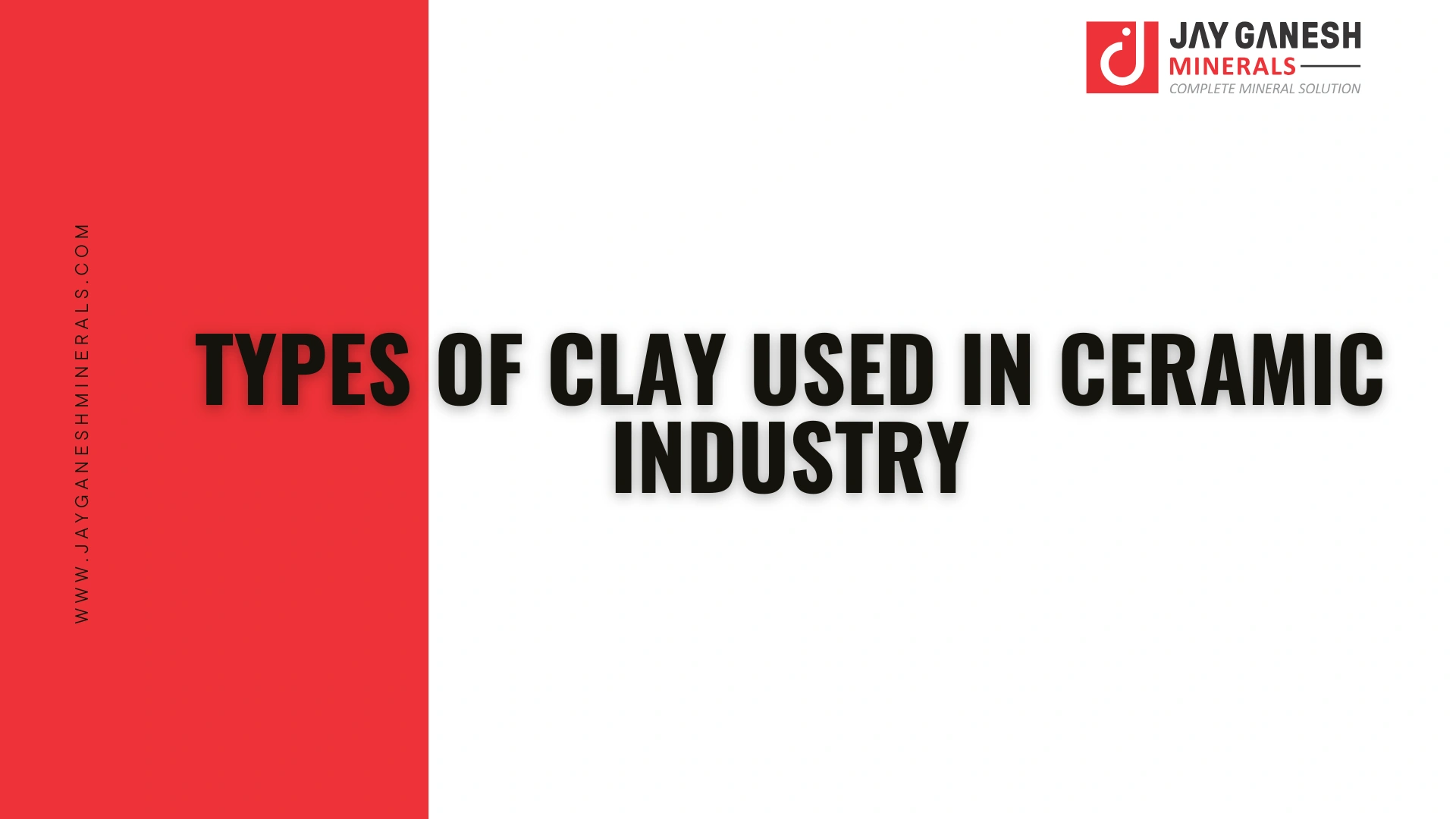
Types of Clay Used in Ceramic Industry
03 March, 2026
07 July, 2025
The famous kaolin clay, which is more exfoliant and oil-attracting, has gained popularity in the global market as one of the hero products in beauty and skin care formulations, largely due to its gentleness. However, little do people know that kaolin has different grades, industrial grade kaolin and cosmetic grade kaolin tailored to different purposes. Application of an improper grade on skin may lead to irritation, exposure to contamination, or inefficiency. So, the concept between industrial grade and cosmetic grade kaolin clay is important to the consumer, formulator, and manufacturer who is concerned with product safety as well as efficacy. Whether it's for kaolin clay for skin, kaolin clay for hair, or cosmetic production, the right grade plays a critical role.
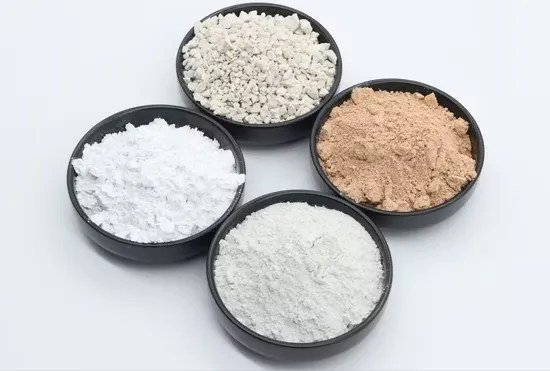
Extraction and processing of industrial-grade kaolin mainly aim at providing raw materials to the industries that will not be in contact with the skin, and thus the ceramics, paper, paints, adhesives, or rubber industries. This kaolin clay grade is not refined to a microbial, particle and heavy metal-free product.
Typical Properties: Coarser particles, possible presence of quartz, feldspar, or iron oxides, and inconsistent mineral composition.
Risk in Skincare: The industrial-grade form (also known as raw form) of kaolin can abrade skin, plug pores, or trigger an allergic reaction and is not recommended for sensitive skin or acne-prone skin. Despite the lower kaolin price, it is unsuitable for skincare formulations.
Main Purpose: Perfect to use at high temperatures, insulating with electricity and bulk material filler, but not in direct contact with humans.
Kaolin clay that is used as a cosmetic is purified to meet dermatological safety standards. It is cleaned, filtered and fine milled several times before it becomes pure, particle soft and microbiologically safe, and hence can be used directly on the skin.
Typical Properties: Ultra-fine particle size, naturally white or lightly tinted, low iron oxide content, and controlled mineral purity. Cosmetic formulators often prefer white kaolin clay for its clean appearance and softness.
Benefits in Skincare: Gives a light exfoliating effect, absorbs oil and oil-based impurities, does not strip natural oils, minimizes inflammation, alleviates acne and can be used every day or every week. These are key kaolin clay benefits for skin when selecting a gentle clay for beauty applications.
Main Purpose: It is perfect in activities such as kaolin clay mask, body powders, baby products, and cosmetics fillers, where the safety of the product and the health of the skin is of utmost importance.
| Aspect | Industrial-Grade Kaolin | Cosmetic-Grade Kaolin |
| Processing | Minimal; removes only large rocks or debris. | Multiple refining steps for chemical purity and microbial safety. |
| Purity | May contain metal oxides, quartz, feldspar, or other minerals. | Extremely low impurities; free from harmful metals and contaminants. |
| Particle Size | Coarse, irregular grains that can irritate skin. | Ultra-fine powder, smooth and gentle on sensitive skin. |
| Color | Varies (gray, yellowish, or red-tinted). | Bright white or subtly tinted (pink, green, yellow) a sign of high purity. |
| Microbial Safety | Not tested for microbes; possible contamination risk. | Tested and certified for microbial cleanliness and stability. |
| Heavy Metals | Possible traces of lead, arsenic, or mercury. | Strictly limited heavy metal content to comply with cosmetic regulations. |
| Cost | Cheaper, used in bulk industrial applications. | Pricier but offers guaranteed skin-safe quality and reliability. |
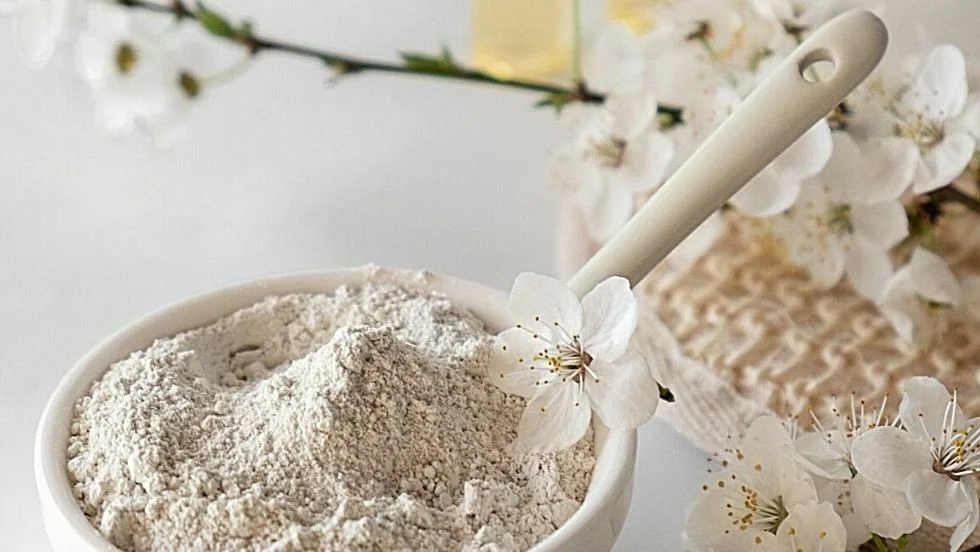
Kaolin, as a cosmetic grade, has a slightly acidic to neutral pH (4.5–6.5), similar to that of the natural barrier of skin, which allows minimum alteration of the acid mantle that guards against dryness, irritation, and invasion by germs. Kaolin at an industrial grade is not pH-controlled and could result in a breakage of this balance, causing sensitivity breakouts. Products like kaolin clay face mask rely on this gentle pH balance.
Cosmetic-grade kaolin has a super-fine mingling, which results in a silky, velvety feel to the skin by providing light exfoliation without abrading or damaging cellular skin. Industrial kaolin, on the other hand, is in the form of coarse particles that can create microscopic tears in the skin and also enhance irritation.
Toxic metals such as lead, arsenic, cadmium, and mercury are strictly checked in cosmetic-grade kaolin, making it safe even to be used in sensitive facial skin. Such contaminants are not tested on industrial kaolin, and they can be a silent killer in long-term contact with the skin.
Kaolin cosmetic grade comes in oily to dry, normal to sensitive. It has been used in a wide range of skin types due to its manageable absorbency level, not over-drying the skin as more abrasive clays may do. This makes it an ideal solution for anyone looking for kaolin clay for skin without side effects.
While some low-cost products might contain industrial-grade kaolin, this comes with serious dangers:
Potential Heavy Metal Exposure: Trouble contaminants like lead or arsenic might accumulate in the skin schema, resulting in skin irritation or even body health down the line.
Microbial Contamination: When the kaolin has not been sterilized, industrial-grade kaolin can contain fungus, bacteria, or spores, which cause breakouts, infections, or skin rashes.
Unpleasant Texture: Rough particles may burn, scrape, or irritate the skin and thus are unattractive or harmful to apply.
Poor Blending in Cosmetics: The raw kaolin could clog or segregate in the lotions, masks, or powder, resulting in patchy use or compromised performance of cosmetics.
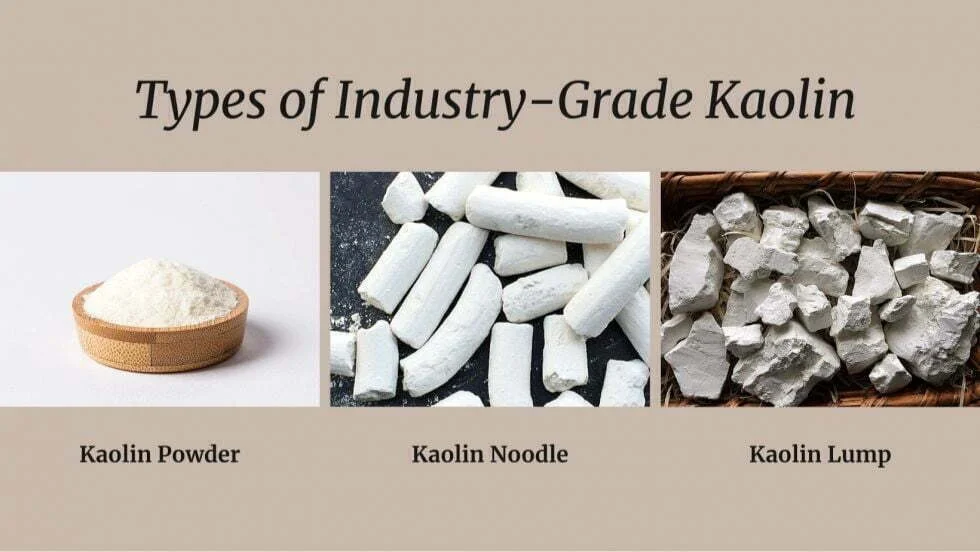
Even though cosmetic-grade kaolin would be appreciated in skincare, industrial-grade kaolin is important and indispensable in a variety of non-cosmetic industries, whose features predestinate it to become an irreplaceable raw material. Industrial-grade kaolin powder makes its way into value not only in beauty, but also in boosting the durability of products, functional performance in manufacturing, and other uses in every industry.
Industrial grade kaolin has several applications in the ceramics industry, including a major constituent in tile production, porcelain, sanitaryware, and fine china. This means that it cannot melt or deform in very hot temperatures, a condition that makes it imperative in ceramic production.
In the paper industry, kaolin can be found as a useful filler and also a coating agent which can enhance the paper's smoothness, brightness and opacity due to its plate-like particles.
Industrial kaolin has found use as an important extender pigment in the paints, coatings and adhesives industries.
Kaolin enhances the tensile strength, toughness, and durability of rubber and plastic products as their filler.
Industrial-grade kaolin is a filter aid and a catalyst carrier in the chemical processing and oil refining industries.
Thermal Stability: Ideal for high-temperature applications like ceramics and refractories.
Chemical Inertness: Compatible with a wide range of industrial chemical processes.
Cost-Effectiveness: Reduces production costs by acting as a bulk filler in paper, rubber, and plastic.
Mechanical Strength: Enhances durability and physical strength in composite materials.
Light Scattering Ability: Improves brightness and opacity in paper and coatings.
| Check Point | What to Look For |
| Product Label | Should clearly state "Cosmetic Grade" or "USP/Pharma Grade". |
| Color Appearance | Bright white or soft pastels only; avoid yellow, brown, or gray hues. |
| Texture | Extremely fine and smooth when rubbed between fingers. |
| Manufacturer Certification | Look for GMP, ISO, or heavy-metal testing certification on packaging. |
| Source or Supplier Transparency | Brands should disclose kaolin origin and purity guarantees. |
Face Masks & Cleansers: Remove oil, dirt, and toxins while soothing inflamed or irritated skin. Popular in kaolin clay face mask formulations.
Mineral Makeup Base: Used as a fine, smooth filler to improve coverage and texture in foundation powders.
Baby Powders: Offers gentle moisture absorption and protection without talc.
Soap Bars & Shampoos: Add natural cleansing and mild exfoliation properties. Also utilized in kaolin clay for hair products for oil absorption.
To get a trustworthy grade of kaolin clay of a high level of purity, Jay Ganesh Minerals is one of the reputed manufacturers and suppliers in the mineral sector. They sell premium kaolin, which fulfills the specific customer demands and at the same time, they are able to maintain quality, safety, and regularity. Jay Ganesh Minerals ensures high standards of quality control and lab-certified purity of kaolin clay, and they are reliable consultants to international markets. If you're sourcing kaolin clay bulk, they offer cost-effective options that align with kaolin price expectations in both cosmetic and industrial markets.
In the world of skincare and cosmetics, ingredient grade matters greatly. Industrial-grade kaolin may be great in manufacturing, but it is simply wrong to apply it directly to the skin. The only form you can trust to place on your face and body is a cosmetic-grade kaolin, very well purified and found to be of high purity, smoothness of particles, and sterilized.
Remember to check the grade of kaolin clay and the authenticity of suppliers to make your skincare routine more healthy, useful, and positive, and not dangerous. Whether you're using it for a kaolin clay mask or seeking out the benefit of kaolin clay, knowing the difference is key.

Whatsapp Chatx
Hi! Click one of our representatives below to chat on WhatsApp or send us email to [email protected]

|
Mr. RAJESH +91 99130 87000 |

|
Mr. JIGNESH +91 89800 70055 |

